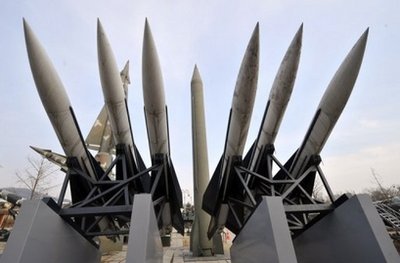Korean Nuclear Envoys Hold Rare Talks in Indonesia
إقرأ هذا الخبر بالعربية
Nuclear envoys from North and South Korea held rare talks in Indonesia on Friday, offering fresh hope for stalled six-nation efforts aimed at curbing Pyongyang's atomic program.
The meeting between South Korea's Wi Sung-Lac and his counterpart, Ri Yong-Ho, was the first-ever North-South meeting on nuclear issues outside the six-party format, a foreign ministry spokeswoman in Seoul told Agence France Presse.
Wi sounded an optimistic tone after emerging from the nearly two hours of talks at a five-star resort on Indonesia's Bali island.
"I had a very constructive and useful conversation with my counterpart," Wi told reporters in English.
Ri was also upbeat and said the two Koreas had agreed to try and quickly restart the six-party talks, according to South Korea's Yonhap news agency.
"We have agreed to make joint efforts to resume the six-party talks," Ri said, according to Yonhap.
Friday's discussions could pave the way for the South's Foreign Minister, Kim Sung-Hwan, to meet his North Korean counterpart Pak Ui-Chun, on Saturday in Bali on the sidelines of the ASEAN Regional Forum.
The North had previously refused to discuss its nuclear program with the South alone, saying it was intended as a deterrent against the United States.
Six-party host China had been pushing for an inter-Korean nuclear meeting, followed by U.S.-North Korean talks, to pave the way for a resumption of the full dialogue.
Friday's meeting came after more than a year of high tensions on the Korean peninsula, after Seoul accused its neighbor of two border attacks which killed 50 people in 2010.
The last round of six-party talks ended without agreement in December 2008. The North formally abandoned them in April 2009 and staged its second nuclear test a month later.
It has expressed conditional willingness to return to the forum, which groups China, the two Koreas, the United States, Japan and Russia.
But the United States, its ally South Korea and Japan have said the North should first mend relations with its neighbor.
Seoul accuses Pyongyang of torpedoing a South Korean warship in March 2010 with the loss of 46 lives.
The North denies involvement. But it killed four people in a bombardment of a South Korean island last November, briefly sparking fears of war.
The South had demanded the North take responsibility for those attacks before any major dialogue. But in an attempt to break the diplomatic impasse, it said this condition would not apply to nuclear negotiations.
"It's been a long time since I met you in London," Wi told Ri as they started the talks on the sidelines of an Asian security conference, Yonhap reported.
He was recalling their meeting at a security conference in Britain six years ago. "Yes, how nice to see you again," Ri responded.
All six-party nations are attending the ASEAN Regional Forum this week.
Before Friday's meeting, the nominee for next U.S. ambassador to South Korea voiced doubt the North was ready to return to serious negotiations.
"We're not convinced that they really are ready to return to serious diplomacy and negotiations," Sung Kim, who is now the special envoy to the moribund six-nation talks, told a Senate hearing on his nomination on Thursday.
"This is why I think Seoul and Washington have both been very cautious in just rushing back to the negotiating table.
"In light of what has happened in the past two years, I think the North Koreans need to prove that they will in fact be a serious partner when the negotiations resume," Sung Kim added.



